Dec
15
A Different Christmas Poem
Filed Under American Patriotism, Peace, Tears of a Warrior, War | Comments Off on A Different Christmas Poem

We included this in last year’s blog. Here it is again.
The embers glowed softly, and in their dim light,
I gazed round the room and I cherished the sight.
My wife was asleep, her head on my chest,
My daughter beside me, angelic in rest.
Outside the snow fell, a blanket of white,
Transforming the yard to a winter delight.
The sparkling lights in the tree I believe,
Completed the magic that was Christmas Eve.
My eyelids were heavy, my breathing was deep,
Secure and surrounded by love I would sleep.
In perfect contentment, or so it would seem,
So I slumbered, perhaps I started to dream.
The sound wasn’t loud, and it wasn’t too near,
But I opened my eyes when it tickled my ear.
Perhaps just a cough, I didn’t quite know,
Then the sure sound of footsteps outside in the snow.
My soul gave a tremble, I struggled to hear,
And I crept to the door just to see who was near.
Standing out in the cold and the dark of the night,
A lone figure stood, his face weary and tight.
A soldier, I puzzled, some twenty years old,
Perhaps a Marine, huddled here in the cold.
Alone in the dark, he looked up and smiled,
Standing watch over me, and my wife and my child.
“What are you doing?” I asked without fear,
“Come in this moment, it’s freezing out here!
Put down your pack, brush the snow from your sleeve,
You should be at home on a cold Christmas Eve!”
For barely a moment I saw his eyes shift,
Away from the cold and the snow blown in drifts..
To the window that danced with a warm fire’s light
Then he sighed and he said “Its really all right,
I’m out here by choice. I’m here every night.”
“It’s my duty to stand at the front of the line,
That separates you from the darkest of times.
No one had to ask or beg or implore me,
I’m proud to stand here like my fathers before me.
My Gramps died at ‘ Pearl on a day in December,”
Then he sighed, “That’s a Christmas ‘Gram always remembers.”
My dad stood his watch in the jungles of ‘ Nam ‘,
And now it is my turn and so, here I am.
I’ve not seen my own son in more than a while,
But my wife sends me pictures, he’s sure got her smile.
Then he bent and he carefully pulled from his bag,
The red, white, and blue… an American flag.
“I can live through the cold and the being alone,
Away from my family, my house and my home.
I can stand at my post through the rain and the sleet,
I can sleep in a foxhole with little to eat.
I can carry the weight of killing another,
Or lay down my life with my sister and brother..
Who stand at the front against any and all,
To ensure for all time that this flag will not fall.”
“So go back inside,” he said, “harbor no fright,
Your family is waiting and I’ll be all right.”
“But isn’t there something I can do, at the least,
“Give you money,” I asked, “or prepare you a feast?
It seems all too little for all that you’ve done, For
being away from your wife and your son.”
Then his eye welled a tear that held no regret, “
Just tell us you love us, and never forget.
To fight for our rights back at home while we’re gone,
To stand your own watch, no matter how long.
For when we come home, either standing or dead,
To know you remember we fought and we bled.
Is payment enough, and with that we will trust,
That we mattered to you as you mattered to us.
Nov
14
REMEMBERING VETS
Filed Under American Patriotism, Family, Peace, PTSD treatment, Tears of a Warrior, Veteran's Day, War | Comments Off on REMEMBERING VETS
by Janet J. Seahorn, Ph.D
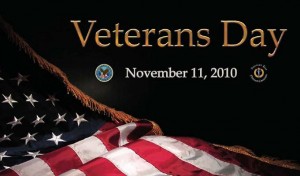
It is cold outside.
I just got home from my last lecture session. Needless to say it was quite interesting as the entire week I have been battling a bad cold and struggling with losing my voice.
Today, there was no voice. Trying to deliver a lecture with laryngitis is a challenge. Hence, I put all of my “words” on my wonderful PowerPoint and proceeded with the lesson.
Since the week is Veteran’s Day week, I decided I would do something different for my university classes. I would talk about the LITERACY of WAR: the vocabulary, the literature, the stories, and of course, the effects of war on both the veteran and the families.
My first slide said this:
My husband is a Vietnam veteran who was a young officer and served in the jungles between the borders of Cambodia and Vietnam. He witnessed a great deal of bloody battles and lost many men. He has two Purple Hearts. The last one he received after being severely wounded. Out of 130 men, only 19 walked away without any injuries. The rest were either killed or wounded. Yesterday I asked if he would like to be the guest speaker for today’s class since I have no voice. His response is what he said he would tell you,
“My wife thinks I’m not miserable enough, so she wants me to talk about PTSD for 90 minutes.”
He said some other things he might share with you, at which time I decided his services would not be needed! (I would like to keep my job.)
Of course my students thought this was pretty funny, even if it was true. But the purpose of this blog is to share with you what I learned from my students. It is pretty sobering.
Out of 140 students, only five had ever had a college session where the professor talked about or honored veterans on Veteran’s Day.
Most students were interested in the session’s information and videos. A few, however, during the first short video paid more attention to their text messages than to the video. Then I put on a slide, “How well did you listen and honor our veterans during the show?” The room was incredible still. The other short clips received 100% of their attention.
- Young people are not insensitive to veterans, I believe their seeming thoughtlessness is not that at all… it is because the adults around them do not take the time to talk WITH them, or to REMIND them of the sacrifices others have made FOR them. Schools, communities, and parents are the ones most at fault. Many have lived the experience and stayed silent. No longer will I remain soundless. I will always give this presentation in the coming years.
- We did an activity where students moved forward when I asked a question if a relative had served, was injured, or died in a particular war. Many took a step when I mentioned WWII. More stepped forward again when I mentioned Vietnam. And last, when I asked about the Iraq/Afghanistan conflict, I was surprised at how many were impacted. Last, I asked for those who had or were currently serving in today’s wars, four stepped forward. I had them face the class so all would see. Then I began clapping and the entire class gave these four young men a standing ovation for their service. It was an emotional moment for everyone.
At the end of class two of the young men commented that this was the first time anyone had acknowledged and thanked them for their service. Today was the first of what I hope will be many. And just as important 140 young people may stop every now and then, think about those who gave and are giving so much, and say a prayer of gratitude.
Perhaps, when they see a vet or know of a family member who has served they will say Thank You.
A few have already called home and done just that.
Aug
28
THINKING ABOUT WAR AND PEACE
Filed Under American Patriotism, Black Lions, Combat PTSD, Tears of a Warrior, Today's War, War, Wisdom | Comments Off on THINKING ABOUT WAR AND PEACE
by Janet J. Seahorn
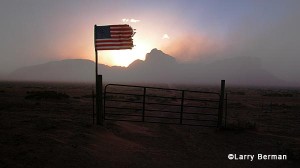
For the last several weeks, my husband and I have been researching and preparing for a presentation we would be giving to the Nebraska Vietnam Veteran Reunion.
We were asked to talk about how we came to write our book, Tears of a Warrior: A Family’s Story of Combat and Living With PTSD. It was such an honor to be invited to be a part of this amazing event which has been going on for the last twenty five years. The night before we left, I read an article Tony had given me titled, “Our Helmets Duel No More”. It was written by retired Lt. General Hal G. Moore. Some of you may be familiar with General Moore as he wrote the books, We Were Soldiers Once… and Young (1992) and We Are Soldiers Still (2008).
Reading General Moore’s experiences regarding the Vietnam War, and later revisiting the country and meeting the Viet Cong General he fought against over forty years ago, made me wonder if such a reunion would ever be possible for those fighting in Iraq and Afghanistan? I questioned whether either side would be able to feel forgiveness. Whether the intense hatred some people in these countries feel for Americans, our way of life, our religions would lessen with time? Whether the many good deeds both our military and civilian organizations are doing building schools, hospitals, and other improvements will be remembered?
What I did not wonder about was the incredible amount of loss, pain, and sorrow war of any kind takes on a country, a community, and, most of all a family. General Moore began his story with these words, “When the blood of any war soaks your clothes and covers your hands, and soldiers die in your arms, every breath forevermore becomes an appeal for greater peace, unity and reconciliation between nations”. Wounds of the body and soul are branded deep into the heart. Those who fight for America pay a very high price for her freedom.
The article read like so many war stories. Trauma, victory, failure, sorrow, the ugliness of battle… and the list goes on. But the piece ended with some pretty profound advice:
When the heartbeat of one soldier stops forever, the heartbeat of our nation should accelerate, driving us to ensure that this life was not sacrificed in vain. It should rouse us to seek better ways to understand and deal with international differences. We owe our dead and their survivors no less. We owe our children, and our children’s children, much more”.
The leadership we loose with each life, the intellectual and emotional goodness broken by combat may only be repaired with each person’s prayer, and every country’s commitment to searching for more appropriate ways to solve our differences. But until or if this every happens, we need to make sure whoever we send to fight our wars, as a nation we must do everything humanly possible to mend, not only the warrior, but the family unit that was also part of the sacrifice.
God Bless America, and God Bless our Vets, Young and Old and their Families
Jul
19
Ancient Wisdom
Filed Under American Patriotism, Black Lions, Combat PTSD, Healing Waters, Tears of a Warrior, Wisdom | Comments Off on Ancient Wisdom
by Tony Seahorn
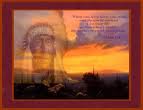
Reading stories from people in ancient civilizations can provide wisdom and understanding. Native American cultures often offer insight into the struggles we face as well as how to move forward.
In the book Keep Going: The Art of Perseverance by Joseph Marshall III, he speaks of a young Lakota boy talking to his grandfather trying to seek answers to his many questions. On one occasion he asks his grandfather “why life had to be so difficult sometimes.” The old man gave this as a reply:
“Grandfather says this: “Life can give you strength. Strength can come from facing the storms of life, from knowing loss, feeling sadness and heartache, from falling into the depths of grief. You must stand up in the storm. You must face the wind and the cold and the darkness. When the storm blows hard you must stand firm, for it is not trying to knock you down, it is really trying to teach you to be strong.”
Facing up to and living with PTSD offers an abundance of opportunities to practice perseverance and growing STRENGTH. At times, it is easy to hope that you have grown enough, but we don’t always get to choose when enough is enough. Life makes some of those decisions for us. And then, Grandfather, in his words of wisdom, offers his grandson these next words:
“Being strong means taking one more step toward the top of the hill, no matter how weary you may be. It means letting the tears flow through the grief. It means to keep looking for the answer, though the darkness of despair is all around you. Being strong means to cling to hope for one more heartbeat, one more sunrise. Each step, no matter how difficult, is one more step closer to the top of the hill. To keep hope alive for one more heartbeat at a time leads to the light of the next sunrise, and the promise of a new day.”
For all of those who face the demons of PTSD, perhaps Grandfather’s words will support you on your long journey. Perhaps Grandfather’s words will give you the power to get through one more day no matter how difficult.
And perhaps Grandfather’s words will “keep hope alive” for a bit longer until you once again feel the warmth of sunshine on your face and begin to live that promise of a new day.
Jul
12
TEARS OF A MOTHER
Filed Under American Patriotism, Combat PTSD, Family, Tears of a Warrior | Comments Off on TEARS OF A MOTHER
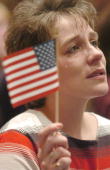
by Janet J. Seahorn
It came in the mail, a letter from a mother of a young vet who has already served a year of duty in Afghanistan. Even though we receive numerous letters from mothers, wives, vets, and even their children, this one kept coming back to my mind. Her words echoed the immense sacrifice families contribute when their loved one(s) serve in the military.
Given the current state of the economy, many military personnel cannot find employment once they are out of the armed forces. Some are left with few viable options to support themselves and/or their families except to re-enlist. This is the situation her son finds himself in now. Having to think about him returning to Afghanistan where every day becomes a bit grimmer is an alarming prospect.
What made her letter resonate familiar memories in me was going back to a time when I, as a young girl, watched and listened to the emotional rollercoaster my Mom (and Dad) went through while my brother was in Vietnam. Some nights when Dad was working late and she thought I was already asleep, I could hear her muffled crying. I am sure she was sobbing into her pillow to reduce the noise of her tears. It broke my heart because I knew there was little I could do to comfort her worries.
Later, after my brother returned home carrying the burdens of war, my mother faced another challenge – how to soothe, support, and deal with a young man who was very different from the happy-go-lucky son she once knew.
The tears continued as did the worries, for she understood that this new battle waging inside of my brother was just as formidable as those he faced in combat. And she understood, once again, there was little she could do to alter my brother’s new journey. She could be present to offer love and the stability of home, but he must be the one to do the work of emotional healing.
Combat’s wounds continue to take an enormous toil on the entire family, not just the vet. Such grief still continues to be done in silence, for vets and their families have long intuitively understood that few people who have not been in their position have a clue about what is occurring, every part of every day. Even if someone was willing to listen, how could one put into words the many hidden demons that returned as part of the baggage of war?
So many tears, so many wounds, and so much healing work still to be done. As long as war is part of our world, there will always be the sacred “Tears of a Mother”.
We need to remember to keep these gentle souls in our own hearts and prayers, and, perhaps somewhere in the distant future, there will no longer be a need for tears to be shed because of war, greed, or some leaders’ insatiable need for power.
When and if such a state of affairs ever happens, tears might be replaced with joyfulness and peace. We can only hope.
Jun
3
Memorial Day in Evanston, WY
Filed Under American Patriotism, Events, Family, Memorial Day, Tears of a Warrior, War | 1 Comment
by Janet J. Seahorn
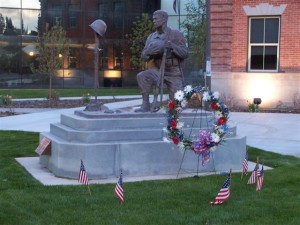
You hear stories about the patriotism of small town USA. The way the community comes together as a single entity to honor its military – those individuals who have served our country. The events always include a bit of flag waving and back patting, “Thank you for your service”. This Memorial Day we had the honor to experience one such town. This is a town, Evanston, Wyoming, which far exceeded any story or past city we have visited.
It was early Sunday evening when we arrived in Evanston. Tony was asked to be the guest speaker at their annual Memorial Day event. We had just returned the day before from Europe. Both of us were more than a bit jet lagged, and I was secretly wishing I was sleeping in my comfy bed back home and wondering what the heck we were thinking when we first accepted the speaking engagement.

As we drove through the streets around town, we noticed flags flying from bridges, street corners, store shops, and of course homes. More flags than we have ever seen. The cemetery was filled with flags and brightly colored flower arrangements. A motorcycle bike rally made the atmosphere even more charged.
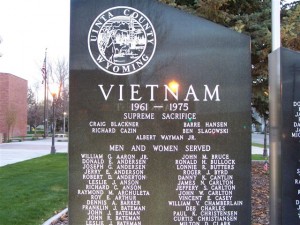
Then we passed a truly humbling sight, the town’s monuments set right in the center of the Court House and Civic Center. Monuments that went way back to the Civil War. The most interesting two tributes were to the Korean and Vietnam conflicts. These were modeled after the Vietnam Wall in Washington D.C. What made them unique, however, was the black granite slabs held the names of every resident of the county who served in the war zone, not just the names of those who had died. The words carved into one stature said it well, “All gave some; some gave all”. Wow! We have never seen a town where every military person was acknowledged. You could trace the heritage of the community’s military generations from WW I forward. Many families had at least four or more last names engraved on each monument. So much sacrifice for a household to bear.
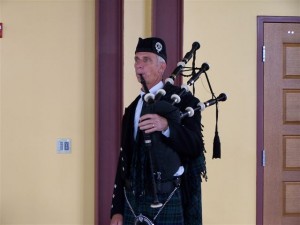
As we listened to the Memorial Day speeches, watched the presentation of flags honoring all military branches, including a flag for the POWs and the MIAs, heard the hallowed sounds of the bagpiper bellowing Amazing Grace, and viewed the solemn and appreciative faces of the people, it was a “lump in the throat” experience. Yes siree, Evanston, Wyoming is truly one of America’s most patriotic towns. It was obvious that such gratitude is a daily way of life, not merely a one day event. They live the words, God Bless America, and God Bless those who serve her mission of freedom and liberty for all.
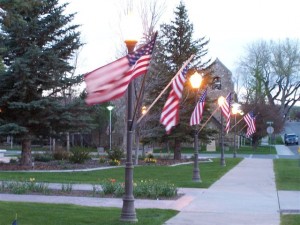
Thank you for sharing your patriotic spirit with us and showing the world that honor, integrity, and flag waving are not political statements, but a way to demonstrate respect for the sacrifice given by the few, so that the many can live in a land of abundance and independence.
Mar
22
What’s Worth Fighting For
Filed Under American Patriotism, Life, War | Comments Off on What’s Worth Fighting For
by Janet J. Seahorn
 Some people may have a difficult time understanding what in this world would be worth giving one’s life. The courage to go into battle knowing the possibilities. Watching while others die or are severely wounded, and still continue to fight. Many poets and philosophers have written how significant it is to live life for something beyond oneself. To live for a cause greater than yourself. This short video was sent to me by my brother. While I listened to the music and watched the screen, it was abundantly obvious why America is definitely worth fighting for. Beyond any political agenda, beyond any religious belief, beyond the love of family and friends, America has given us bountiful blessings with such amazing beauty. Yes, America is not only beautiful; it is worth living and dying for in our lifetime.
Some people may have a difficult time understanding what in this world would be worth giving one’s life. The courage to go into battle knowing the possibilities. Watching while others die or are severely wounded, and still continue to fight. Many poets and philosophers have written how significant it is to live life for something beyond oneself. To live for a cause greater than yourself. This short video was sent to me by my brother. While I listened to the music and watched the screen, it was abundantly obvious why America is definitely worth fighting for. Beyond any political agenda, beyond any religious belief, beyond the love of family and friends, America has given us bountiful blessings with such amazing beauty. Yes, America is not only beautiful; it is worth living and dying for in our lifetime.
http://sagebrushpatriot.com/america.htm
Mar
2
Honoring Warriors
Filed Under American Patriotism, Events, PTSD, Quilts of Valor | 1 Comment
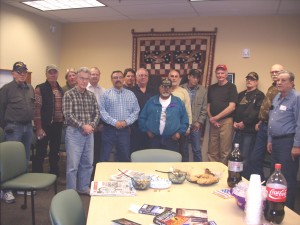
Veterans
by Janet Seahorn
At first it appeared to be an ordinary Thursday evening in mid-February. The soldiers of battles-past gathered at the new Fort Collins Vet Center for their weekly group meeting with the professional VA Staff.
They draw together to heal wounds that occurred long ago in a land far from home. Wounds acquired from serving in Vietnam – a war where few were honored for their personal sacrifice for their country. The veterans meet to try and understand why their scars linger and are still so painful after so many years. And they meet to try and find a sense of recognition of what each has experienced in life – both past and present.
It was on this night that several Fort Collins community members presented a “Quilt of Valor” to those warriors who gave much and were given little in return. Through their generous donations, the community was able to acquire a special hand-made quilt for the presentation.
The quilt was one small way of saying “Thank you for your service and sacrifice”. And, maybe, the quilt would become a symbol of comfort, hope, and honor. This particular comforter was carefully crafted by Donna Roche and the Quilters of Rogers, Arkansas. Her group has assembled and mailed over 700 similar quilts to wounded warriors in hospitals in Iraq, Afghanistan, Germany and the United States. Ms. Roche and her group explain the Quilt of Valor in this manner:
“The Quilt of Valor is our wounded warrior award for service, sacrifice and valor in the line of duty. It is our way of saying “Thank you for your service – you have not been forgotten.” Many caring souls are involved in making the quilts; from contributing quilt blocks, finishing the tops, and integrating each section into the final product. Each special quilt receives a “Quilt of Valor” label thanking the injured warrior for his/her dedication and sacrifice. The label contains the name of those involved in the making of each caring blanket.”
The Quilt of Valor is in fact a symbol of renewal. It transforms the hands of war’s destruction through the caring quilter’s fingers of each blanket’s construction. It shifts the heart from the darkness of combat to the light of a kinder future. And, hopefully it moves the experiences of combat trauma to a quieter sense of peace.
On this Thursday evening, warriors who were never honored finally have their Quilt of Valor. The gratitude in their teary eyes, said it all. Perhaps, after all these years, others do care. Perhaps, there is now a sense of acknowledgement of what these warriors gave without hesitation. You see, it is never too late to say thank you, and the heart is never too old to feel the warmth of such a genuine gesture.
Jan
6
2010 New Year’s Wishes
Filed Under American Patriotism, New Year, Peace, War | Comments Off on 2010 New Year’s Wishes

by Janet J. Seahorn
It’s already time for a brand New Year
Filled with new hope, dreams and some cheer.
For many their prospects are filled with great joy
While others the forecast may seem a bit grim.
Perhaps we can change the Year 20 and 10
And make it a season for our world to mend.
A year of forgiving,
A year of great love,
One of abundance sent from above.
A year without conflict,
A year where wars end,
A time where the goodness of angels commend.
A year of good fortune,
A year without hate,
When lies and untruths and battles abate.
A year where one’s word
Can be totally trusted,
Where nothing is left but goodwill and justice.
A year without fear,
A year where we’ve learned
Those rainbows are just around the next turn.
A year where we find
That we are not lost,
That life must be lived no matter the cost.
A year that we take
One step at a time
Trusting to see and feel the sublime.
A very deep breath
And we’re on our way
To making each moment a true New Year’s Day.
May your coming year be filled with love,
safe-keeping and prosperity.
Jan
3
A Perspective on War
Filed Under American Patriotism, PTSD, Today's War, War | Comments Off on A Perspective on War
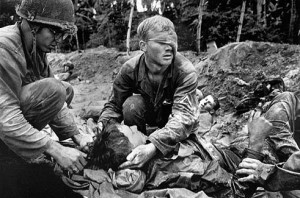 I seem to spend a lot of time thinking about war, even when I don’t want to. The reality of war. The horror of war. What does winning a war really look like? Are war and terrorism even related or is one a symptom of the other?
I seem to spend a lot of time thinking about war, even when I don’t want to. The reality of war. The horror of war. What does winning a war really look like? Are war and terrorism even related or is one a symptom of the other?
Following is an article in today’s Denver Post which provides a perspective…
-Tony Seahorn
Fool’s game: A soldier’s lament
By Megan Nix
Posted: 01/03/2010
My friend from Denver, a thirtysomething with a full red beard, a plaid shirt, and a loud, choppy laugh, looks like any guy you might have a drink with to talk about girls or music or the work week.
The last time I hung out with him, we shared a beer stein on Larimer Street during Oktoberfest and talked about Halloween costumes. During a more recent happy hour, we talked about the summons he received to deploy to Afghanistan.
Because of the Army’s Uniform Code, I can’t name him. Suffice it to say he’s the one person in the 30,000 who got that call to whom I can give a voice.
It was Nov. 11, 2009, Veterans Day, when my friend was called back to war. His friends had taken him out to shoot clay pigeons in honor of his being a veteran in Iraq, and when he went to his parents’ house for Sunday dinner, a big envelope was waiting for him. He went down into the basement where his father, a potter, was shaping clay. “I just walked up to him and gave him a hug,” he says, smiling from above the amber glow of his draft beer. Hugs are not something he regularly does. “Then I stepped back, and I said, ‘Dad, I’m going to Afghanistan.’ ”
Like most soldiers, he’s dealing with some of the same symptoms as one of his heroes, Audie Murphy, a World War II vet who publicized the unseen wounds of war. Fear, insomnia, depression, a loss of faith in our country’s leaders, and a nightmarish reluctance to re-enter the world “outside the wire.” Like any young man who’s already been to war once, my friend is doing everything he can in order to not be deployed twice.
When he served in Baghdad, there were four to five American deaths a day, the city was a “cesspool,” and “generals were being moved around like playing cards. People don’t realize how much worse it is than what you see on TV. In a city that goes to war, services stop – sewage, water – there’s very limited law and order. You can’t even imagine how awful the world is when a war is happening there.”
Despite his hearty laugh and recurring shrugs, he exudes disillusionment. We’re nestled in a leather booth, and at the bar, two toothless men start to shove each other against the stools and shout obscenities.
“I bet you,” my war-bound buddy says, “at least one of them is a vet.” It doesn’t matter if they’re vets or not, at least one person here is, and those unseen wounds of war? I can see them in this bar.
“My job in Iraq as a public affairs specialist was to prove, ‘What’s the good here? What’s the silver lining? How can I slant this to look good?'” my friend explains. “If you’re very honest,” he says, with signature honesty and one hack of a laugh, “you could never do it.”
One of the reasons he has agreed to talk to me is so that he can be honest, albeit anonymously. The namelessness seems to fit: Both Iraq and Afghanistan are wars largely stocked with low- to mid-level soldiers on repeated deployment. Soldiers from Nowhereville, U.S.A., young men and women who will die largely unrecognized for being, as my friend says, “some sort of hero.”
He’s not in the business of sugar-coating. Bombs are the best way to kill because no one has to be there, he tells me. He recounts how the fluids on the floor of a walk-in freezer stacked with car bomb victims flowed, tar-black, to a drain under his feet. “Beyond capacity,” is how he describes the scene of the nameless corpses. “Innocent victims of roadside bombs gone wrong. The unwanted. Victims that will never ever be identified.”
My friend’s insights increase with the drinks. He points out that while what we have is called a “volunteer army,” life circumstances are what dictate if enlisting is in a kid’s future. “See those guys?” he points to the two men who have stopped fighting and are staring blankly at their sentinel of empty shot glasses. “If they did serve, I can almost guarantee they came from little money. No Haliburton sons and daughters are dying in Iraq or going to Afghanistan,” he says, pushing his finger into the beer-stained table. “I can’t even tell you how many Army leaders I’ve seen without a combat patch (signaling they’ve been deployed) on their right arm. It just shows you how many people aren’t bearing the weight of this war.”
The weight of his story accumulates like a collection of heavy fragments.
A break for a granola bar on the back of Vehicle 2. A deafening explosion. A puff of smoke where Vehicle 4 had been.
Like many young men who enlist, my friend wanted to be independent of his parents and the military was the best possible solution, so he enlisted five years ago. “I thought if I don’t find anything I’m passionate about, I should go,” he says.
By now, he’s gathered plenty of things to be passionate about. One of them is not returning to Afghanistan. As a technically disabled vet who already did five years, was honorably discharged, and “did everything I was ever asked,” he received the news of his “involuntary mobilization” with reluctance and disbelief. He knew he was subject to recall until June 2012, but opening the envelope was one of those times when you say, “Seriously? I mean, seriously?”
Really, he did more than he was asked to do: He volunteered to fight at a time when he knew he’d likely be deployed. He was stationed in Iraq during one of its bloodiest summers. And, most importantly, he came back.
He also has simpler reasons for not wanting to return: He doesn’t know if he can pick up a 200-plus-pound person. He doesn’t want to carry a weapon. And he doesn’t want to be a pawn in a game of politics if part of the reason the withdrawal is scheduled for 2011 is because President Obama is up for re-election in 2012.
After opening his Afghanistan envelope, my friend immediately called his superior to appeal. “What’s the deal?” he asked. “I cannot do this again.” And the noncommissioned officer on the phone replied: “Look, we are scrounging the bottom of the barrel right now. The bottom of the barrel.”
One of the two men at the bar says he doesn’t have the money to pay for his drinks tonight, stands up from his tattered stool to leave, then sits back down. Someone puts a coin in the jukebox and I’m hoping the song will be happy, but it’s not. Bonnie Tyler’s voice starts in on “Nothing but a Heartache.”
“I only saw the effects of war, not the worst of it,” my quieted friend admits as the song reaches its refrain. “For every war story, there’s a better story not being told. Those go to the grave. Or they’re stories that the people holding them can never begin to relive.”
Tyler croons, “It’s a fool’s game,” while I work on my next beer.
I’m not sure what I should tell this young, smiling and wounded man in front of me. That he’ll be fine and somehow his appeal will be granted, and if not, he’ll come back and we’ll have beers and it will be over. We both know that soon he’ll probably be on a plane with his 60 pounds of gear, looking for silver-lined stories to send back to middle American about the benefits of being at war.
“It’s a heartache,” she sings: “Nothing but a heartache. Hits you when it’s too late. Hits you when you’re down.”
There are many things to thank my friend for, but the only thing I thank him for at the end of the night is his time, and at least that feels like a little bit of sincerity in the midst of everything we’ve both heard and read about our reasons for sending him to Afghanistan. “I’ll see you soon,” I tell him, and the last thing I say – my minuscule gift of acknowledgment – is his name.
The silver lining in this story? I’m still looking for it.

